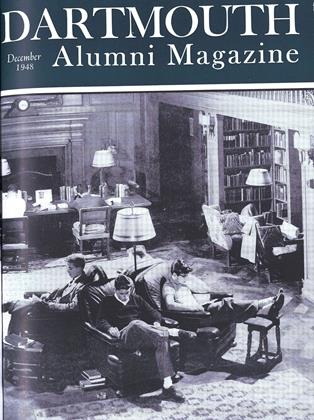IT is not always easy to review dispassionately the book of a friend, but in the short space allowed I shall do my best with Dilys Laing's first novel TheGreat Year, recently published by Duell, Sloan and Pearce.
A clue to the book may be found in TheShepherd's Calendar: "We shepherds say that the age of man is seventy-two years and that we liken but to one whole year." This provides the key to the inner meaning of the book which is "modern man's need to restore his soul by remembering that his life is rooted in the vast pattern of the year, and still more deeply to the time-scheme of the generations, and is not to be thought of as an individual flash in the pan."
Instead of writing another thousandpage novel telling in infinite detail the lives of several generations, Mrs. Laing (the wife of Alex Laing '25) has chosen to develop her theme by writing several vignettes, complete episodes in themselves, ranging in time from March 1874 to a future still to come, in an endeavor to show man as an eternal and unchanging figure in the four seasons of "the great year."
There is, of course, the risk of ambiguity involved in switching back and forth in time in each chapter. One gets a series of pictures and impressions sometimes without enough continuity, but as the author has written what she herself describes as a legend of parents and children her method has a certain validity. I felt, especially in Chapter 6, in which she imagines certain events happening in April 195-, that she reveals the main weakness inherent in her plan.
It is clearly evident that the author is a woman and a poet: "Aaron gave Sam a swig of grog and it felt like a little sun shining inside him."
This is a well written book, with many fine things in it, though not entirely realized as a novel. My most serious complaint is that the book is saturated a little too much with the author's own feminine and compassionate humanitarianism. Sometimes her characters, it seems to me, think and act out of character, and lose themselves in Mrs. Laing's fiery idealism. I thought Delia the most perfectly realized character in the book.
The Great Year, however, reveals a fine and sympathetic spirit, and contains several scenes of real beauty and power. I recommend it especially to the wives of my readers who may also look forward with great interest to Mrs. Laing's next book.
Eric P. Kelly '06 has written for me: "For those thinking persons who are looking for peace and advancement in this troubled world, Human Destiny by Lecomte du Noiiy bristles with hope so keen that the reader is immediately elevated into a mood of optimism. For this convincing study written by a biologist is scientific to the last degree and absolutely reasonable. The author, following the course of Biological Evolution holds out the theory, perhaps suggesting Bergson, that a more powerful Evolution is going on unconsciously in the intellectual and spiritual nature of man, that here and there new evidences of it are constantly appearing, and that on some fortunate, future day, the whole human race will emerge not only as a high biological type but as a spiritual and mental type." Let us hope, with Colonel McCormick, that this is so.
Bob McKennan '25 loaned me this fall one of the finest fishing books I ever read: Roderick Haig-Brown's A River NeverSleeps (Morrow, 1946.) I already owned his The Western Angler (Derrydale), two volumes, 1939, and Return to the Rivet, 1941. Any of these would make an excellent Christmas present for any man who loves to cast a fly. In his latest book the author writes mainly of the Northwest, but on occasion swings back into memory to England's chalk streams. In his last chapter he recommends his favorite fishing books, some of which I own and have loved, as for instance, J. Waller Hill's ASummer on the Test.
A good sea story is Andrew Geer's TheSea Chase (Harper, 1948.) This exciting story deals with the amazing voyage of the German freighter Ergenstrasse running home from Sydney in the fall of 1939 to escape the British. Captain Ehrlich, driven by a German daemon that is completely ruthless, takes his ship through tropic seas and Arctic hurricanes only to be tripped up by an English officer he despised and misunderstood just at the threshold of success. With Ehrlich are Walther Stemme, the victim of his ruthlessness, Kirchner, his Nazi rival, Elsa (could Geer have had the films in mind?) who is not entirely bad, Wesser who finally avenges his friend Walther, and others. This is no ordinary yarn but a really fine sea story. Pom Pom Guli, a tropical island, will recall painful memories to many a G.I.
A Merry Christmas to you all! and peace on earth and good will to men.
 View Full Issue
View Full Issue
More From This Issue
-
 Article
ArticleCancer Pain Reduced Through His Research
December 1948 By JOHN HURD '21 -
 Article
ArticleDeaths
December 1948 -
 Lettter from the Editor
Lettter from the EditorLetter From Paris
December 1948 By WILLIAM I. ZEITUNG '43 -
 Class Notes
Class Notes1918
December 1948 By ERNEST H. EARLEY, DONALD L. BARR, DAVID L. GARRATT -
 Class Notes
Class Notes1939
December 1948 By RICHARD S. JACKSON, GEORGE R. HANNA -
 Class Notes
Class Notes1931
December 1948 By A. W. LAUGHTON, WILLIAM H. SCHULDENFREI, CHARLES S. MCALLISTER
HERBERT F. WEST '22
-
 Article
ArticleHANOVER BROWSING
April1935 By Herbert F. West '22 -
 Article
ArticleHanover Browsing
April 1939 By HERBERT F. WEST '22 -
 Article
ArticleHanover Browsing
June 1943 By HERBERT F. WEST '22 -
 Books
BooksCONTRARY COUNTRY
December 1950 By HERBERT F. WEST '22 -
 Article
ArticleHanover Browsing
January 1954 By HERBERT F. WEST '22 -
 Article
ArticleHanover Browsing
April 1955 By HERBERT F. WEST '22








